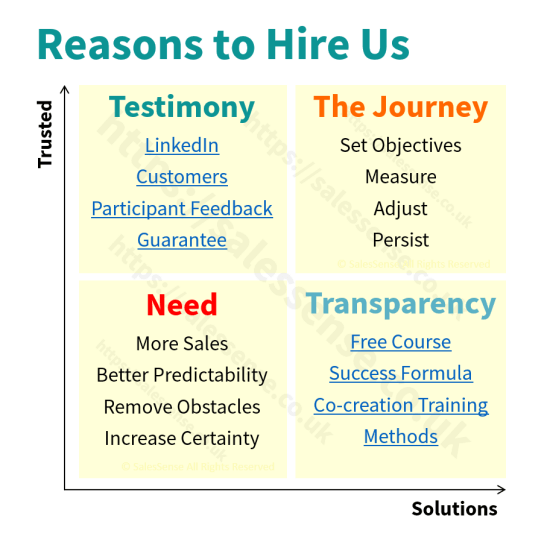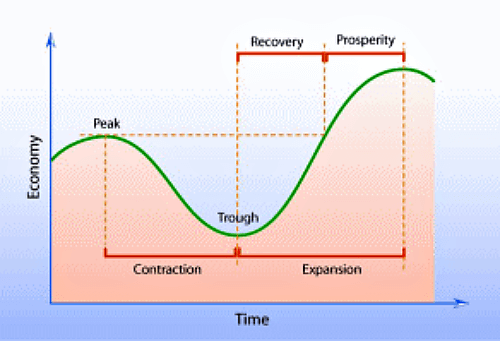Sales training for selling in a downturn. Business survival tactics for a sales crisis.

Sales crises come along regardless of trading conditions. When they occur in a business downturn, difficulties multiply. In such situations, increasing sales is a much better solution than cutting costs. Selling in a Downturn focuses attention on the right priorities.
What type of sales training is the most effective?
- Training based on best practice research hand professional experience.
- The upside down classroom where participants study the course modules in advance of training sessions.
- Training time is used for exercises, planning, and preparing to put learning into practice.
- The creation of workplace actions for embedding learning in routines and habits.
- The opportunity for one-to-one learning.
- Delivery by the course author.
- An effectiveness guarantee.
Renew motivation through training by doing. Participants take on workplace assignments in one-to-one or group briefing sessions and reconvene to review results, adjust their approach, and take on their next assignment. Training can be spread over several months, condensed into longer intensive sessions, or delivered over two consecutive days.
Key Takeaways
- Find the hidden prospects.
- Eliminate time-wasting false opportunities.
- Have prospects tell the truth.
- Accelerate the sales process.
Participant Comments
It did what it said on the tin. I would recommend this course for salespeople selling complex products and systems whether in a downturn or not. The ROI and selling process sections were especially useful. Base Plus
Thanks Clive, really enjoyed the course and found it of great use . . . lots of thought to convert into reality. Integralis
I really enjoyed how it was very pin-pointed to concrete examples, was easy to relate this to my own position. It was also interesting to meet different people and hear their experiences and thoughts around the topics we went through. Ceetron
Programme includes:

- Pre-course questionnaire.
- Pre-work preparation guide.
- Personalised workplace assignments.
- Programme slide decks, tools, and materials.
- Online resources.
- Career-long support.
Materials and resources
- Self-study white paper.
- Accelerated learning guide.
- Profit contribution calculator
- Market sector analysis tool
- The New Way to Get Referrals - report.
- Quantified qualification assessment tool.
- Quantified qualification presentation template.
- How to Read People - guide.
- CLEAR Rules for Sales Discovery.
- Discovery questions prompt template.
- Example discovery questions.
- Dealing with budget secrecy guide.
- Gaining access to decision influencers' report.
- Setting up a sales process agreement guide.
Every once in a while, a sales crisis comes along that surprises everyone. Sometimes the cause affects everyone in a market. At other times individual organisations are afflicted. It is easy to become complacent when times are good. Now is the time to prepare for the next sales crisis. Selling in a Downturn shines a spotlight on opportunities to tighten up the sales process and improve sales habits.
Selling in a Downturn Training Delivery Options
One-to-One
Twelve 1-hour of six 2-hour virtual sessions with the course author.
£1295 - Learn more.
One to One on a per-session basis.
£150 - Learn more.
Group Training - Schedule twelve 1-hour or six 2-hour virtual classroom sessions.
£4795 for up to fifteen people.
Group Training per 1-hour session.
£450 for up to fifteen people - Learn more.
Fees exclude applicable VAT.
Traditional Classroom
The programme delivery takes place over one or more days at a conference venue or at the customer's offices. This is effective for three or more participants. Contact us for fees.
What are the best B2B sales strategies in a business downturn?
In a business downturn, B2B companies need to adapt their sales strategies to maintain and grow their client base. Here are some of the most effective B2B sales strategies for navigating challenging economic conditions and selling in a downturn:
1. Strengthen Existing Relationships
Focus on Customer Retention: Prioritize current clients by offering superior service and support. Regular check-ins, updates, and personalized service help build loyalty.
Upsell and Cross-Sell: Identify additional products or services that align with clients’ needs to increase their value while demonstrating cost-effectiveness.
2. Emphasize Value Over Price
ROI-Focused Selling: Highlight how your products or services can save money or increase efficiency. Demonstrate measurable outcomes with case studies and data to show return on investment.
Consultative Approach: Act as a strategic advisor who understands clients’ pain points and offers tailored solutions, reinforcing that your product is a necessity rather than a luxury.
3. Adapt Sales Messaging
Address Current Challenges: Adapt your sales pitch to acknowledge the specific issues faced during the downturn. This shows empathy and positions your company as a partner in overcoming challenges.
Highlight Cost Savings and Efficiency: Stress solutions that cut costs or streamline processes, making them attractive options when budgets are tight.
4. Leverage Digital Tools
Virtual Selling: Utilize video conferencing, webinars, and digital sales platforms to maintain strong communication with clients and prospects.
Automated Outreach and Follow-Ups: Use CRM tools and email automation to keep in touch with clients consistently without stretching resources thin.
5. Flexible Payment Options
Offer Customized Payment Plans: To ease the financial strain, consider flexible terms such as instalment plans or deferred payment options.
Subscription Models: If applicable, shift to subscription-based or consumption-based pricing that allows clients to scale expenses with usage.
6. Expand Your Network and Partnerships
Co-Marketing and Partnerships: Partner with complementary businesses to expand reach and share resources.
Referrals and Word-of-Mouth: Encourage satisfied clients to refer others by implementing a structured referral program.
7. Revisit and Refine Target Markets
Identify New Segments: Reassess market data to spot industries or business segments less affected by the downturn and tailor outreach to them.
Focus on High-Value Targets: Prioritize leads and accounts that have shown consistent interest or need for your solutions.
8. Invest in Training and Development
Sales Training: Equip your team with training focused on empathy, objection handling, and adaptive selling techniques.
Continuous Learning: Encourage ongoing skill development in digital tools and market trends to stay competitive.
9. Double Down on Marketing and Brand Presence
Content Marketing: Create thought leadership content, such as whitepapers, articles, and webinars, to establish authority and build trust.
Social Proof and Testimonials: Use case studies and client testimonials to provide evidence of your success and reliability.
10. Maintain Agility and Flexibility
Adapt Quickly to Feedback: Be prepared to pivot strategies based on feedback and market conditions.
Test New Channels: Experiment with new sales channels or outreach methods to uncover additional revenue streams.
Implementing these strategies can help B2B businesses not only survive but thrive during an economic downturn by reinforcing relationships, offering tangible value, and staying agile to shifting market dynamics. For a deeper dive and help changing behaviours, take our Selling in a Downturn course.
Guarantee
We unconditionally guarantee the quality and effectiveness of our services. In addition, we warrant that the application of the principles, methods, and practices presented in our materials will lead to a gain in value equivalent to at least five times the fees. Should you decide that our services have not met this guarantee, we will refund your fees promptly and courteously.
Note: Quoted fees exclude VAT chargeable in the UK and EU.
Terms of Site Use and Terms of Supply apply.
If you are facing a sales crisis, business survival issues, or operating in difficult market conditions, Selling in a Downturn offers an immediate boost. Telephone +44 (0)1392 851500. We will be pleased to learn about your needs and discuss some options. Alternatively, email custserv@salessense.co.uk or use the contact form here.






















